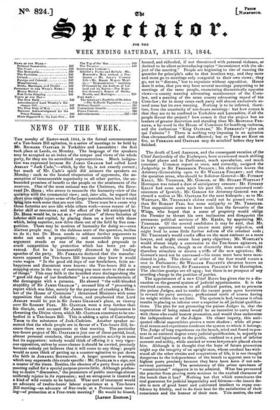NEWS OF THE WEEK.
THE novelty of Easter-week 1844, is the formal commencement of a Ten-hours Bill agitation, in a series of meetings to be held by Mr. RICHARD OASTLER in Yorkshire and Lancashire : the first took place at Leeds, on Monday. The language of the speakers may be accepted as an index of the temper and views of the whole party, for they are its accredited representatives. Much indigna- tion was expressed because Sir JAMES GRAHAM had called Lord ASHLEY "Jack Cade,"—which, by the by, is not exactly correct ; but much of Mr. Cade'e spirit did animate the speakers on Monday : such as the heated vituperation of opponents, the as- sumption of immeasurable superiority to all other parties, the un- bounded promises of benefit to the people on the attainment of the nostrum. One of the most rational was the Chairman, the Reve- rend Dr. HOOK; who strove to reconcile the humanity-view of the question with the commercial view ; and, inter alio, he argued that short time might injure some of the larger manufactories, but it would :Wing into work some that are now idle. There must be a cause why those factories are now idle while others work—some reason of in- ferior skill or resources ; and the effect of the bill anticipated by Dr. Hooe would be, to act as a "protection" of those factories of inferior skill and capital, by placing them on a level with those which, being superior, now drive them out of the field by free com- petition. There may be motives of humanity for doing so—even discreet people may, in the dubious state of the question, incline to do it ; but Dr. HOOK needs to adduce further arguments to make out such a proposition; and meanwhile his present orpiment, stands as one of the most naked proposals to crush cquipetition by protection which has been yet ad- vanced. But he is immeasurably distanced by the leading apostles of the party. Mr. FERRAND declared that the manufac- turers opposed the Ten-hours Bill because they knew it would swim wages. "In the good old days of our forefathers, little un- happiness and discontent were known : the Ten-hours Bill is a stepping-stone in the way of restoring you once more to that state of things." This easy faith in the beatified state distinguishing the -" good old days of our forefathers" is a common characteristic of the demagogue with a panacea. He abused "the cold-blooded stupidity of Sir JAMES GRAHAM"; accused him of "procuring a report which was false, merely for the purpose of crushing a Mem- ber of the House of Commons"; threatened Ministers with some opposition that should defeat them' and prophesied that Lord _ASHLEY would be put in Sir JAMES GRAHAM'S place, as viceroy over Sir ROBERT PEEL. Mr. OASTLER went a step further than his disciple, and accused Sir James GRAHAM of impiousness in thwarting the Divine views, which Mr. OASTLER construes to be em- bodied in a Ten-hours Bill. This is adding a spice of Canterbury Thou to the substance of Jack-Cadeism. Another speaker as- sumed that the whole people are in favour of a Ten-hours Bill, be- cause there were no opponents at that meeting. The particular len-hours project of Mr. OASTLER is just one of those partial, local, almost personal crotchets, that provokes positive activity in none but its supporters: nobody would think of offering it a very vigor- ous opposition, unless by some chance it should be carried, precisely because nobody yet believes that it will come to any thing: people would as soon think of getting up a counter-agitation to put down the faith in JOHANNA Sourneorr. A larger question is arising, which may supersede this crude specific : Mr. OASTLER is a sign, not
master of the times. Besides, the absence of a party from a public meeting called for a special purpose proves little. Although profess- ing to desire " discussion," the promoters of public meetings almost uniformly rejoice in its repression ; and an antagonist is treated as a kind of wild vermin to be baited. What sort of treatment would an advocate of twelve-hours' labour experience at a Ten-hours Bill meeting—an advocate of free-trade at a Protectionist meet- ing—of protection at a Free-trade meeting? He would be hissed, hooted, and ridiculed, if not threatened with personal violence, or desired to be silent as introducing topics "inconsistent with the ob- ject of the meeting." People are beginning to tire of running the gauntlet for principle's sake in that bootless way, and they more and more go to meetings only congenial to their own views ; they go, not to "discuss," but to expatiate without opposition. Hence does it arise, that you may have several meetings purporting to be meetings of the same people, enunciating diametrically opposite views—a county meeting advocating maintenance of the Corn- law, and a meeting of the same county advocating repeal of the Corn-law ; for in many cases each party will almost exclusively at- tend none but its own meeting. Nothing is to be inferred, there- fore, from the unanimity of ten-hours meetings : but how comes it that they are to be confined to Yorkshire and Lancashire, if all the people favour the project ? how comes it that the project has no leaders of greater discretion and standing than Mr. RUSPIELD FER- RAND, a by-word in the House of Commons for headlong rashness, and the enthusiast "King OASTLER," Mr. FERRAND'S "plus sot qui l'admire" ? There is nothing very imposing in an agitation thus circumscribed and thus officered; but as THOM set Kent on fire, so FERRAND and OASTLER may do mischief before they have finished.


























